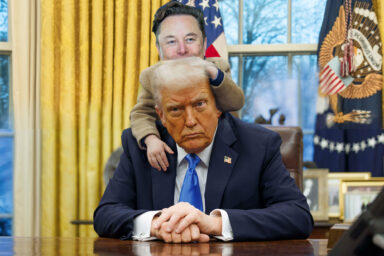Recently a New York Times Magazine article profiled Cass Sunstein, the most powerful man in government you never heard of. And it absolutely buried the lead—the main reason to take an interest in this fellow.
Under the decidedly benign headline “Cass Sunstein Wants to Nudge Us,” we learn that Sunstein, a close friend of President Obama, runs the Office of Information and Regulatory Affairs (OIRA), a little-known White House office that reviews the big regulations coming out of federal agencies.
We learn that
The office that Sunstein occupies is a kind of cockpit for the modern administrative state.
We learn that Sunstein
is certainly the most productive and probably the most influential liberal legal scholar of his generation….
In what is certainly an interesting if somewhat vague article, we quickly also learn that
Sunstein wants to use OIRA to make regulations more supple, not less robust. Government regulations can operate at the level of philosophy, elaborating how you weigh the interest of the individual against that of society….
What does this mean? We have to wait 35 paragraphs, to the end of the article, to learn how this might manifest itself if he could do what he wanted:
Sunstein had, during his academic career, a penchant for publishing trial balloons—they were a necessary part of his inquiry, a perpetual what if? Now, with their author a government official, some of these conjectures seem more worrisome. Sunstein has, for example, written often about the corrosive effects of rumors and falsehoods on democratic discourse (it is the subject of one of the two books that were published while he was waiting to be confirmed last year), and in a 2008 paper, he proposed that government agents “cognitively infiltrate” chat rooms and message boards to try to debunk conspiracy theories before they spread. The paper was narrowly concerned with terrorism, but to some, these were dark musings. The liberal essayist Glenn Greenwald, writing in Salon, called the proposal “spine-chilling.”
Yet, the article provides a cop-out.
…Many innovative ideas—among them, some of the corrections proposed by behavioral economics—are still hypotheses. Like Sunstein, their brilliance comes with speculation, and it comes with whimsy.
I.e., don’t worry, Sunstein was just playing around with his dark idea of government agents going undercover to shape political discourse. But was he?
The paper then quotes Sunstein seemingly dismissing the whole thing:
“There’s a big difference between the role of an academic and the role of someone in government,” Sunstein told me when we spoke at the Au Bon Pain near the White House…..”When I was an academic, I’d sometimes get a little feeling of excitement when I had an idea that was, I hoped, fresh,” he said. “And whether anyone should act on that idea is a very different question.”
The reader will be forgiven for not realizing that the interview at Au Bon Pain took place in the fall of 2009—that is, before Sunstein’s controversial paper came to light. So why did the Times give the impression that it had contacted him and gotten a reaction to the tempest? We never do learn whether he really intends to follow through on his bizarre proposal.
But consider this seemingly unrelated comment from his wife, found some 20 paragraphs earlier in the article, in which she relates a story about an early date with Sunstein:
…she asked him if he ever fantasized about doing anything else. “I expected him to say he dreamed of playing for the Red Sox,” she told me. “His eyes got real big and he said: ‘Ooh! OIRA!’ ”
“And I said, ‘What the hell is that?’ “
Good question. Why would a guy want so badly to head up such an obscure agency unless he saw an opportunity to advance his ideas? What other motive would he have had?
The real meat here seems to be buried, and was likely missed by most people. Who reads an article blandly called “Cass Sunstein Wants to Nudge Us?” And, really, does he want to “nudge” us? Or does he want to give us a good hard shove? It would seem that having a person with such neo-Nixonian views in an important position and exerting influence on the president of the United States might warrant some additional inquiry.


